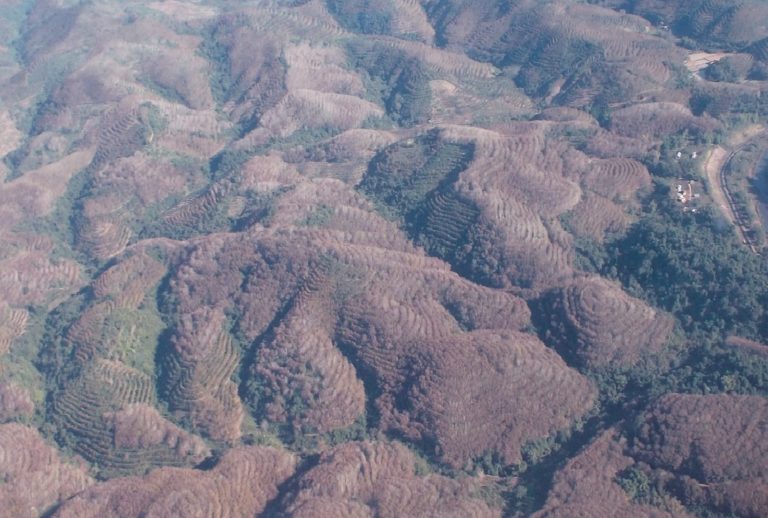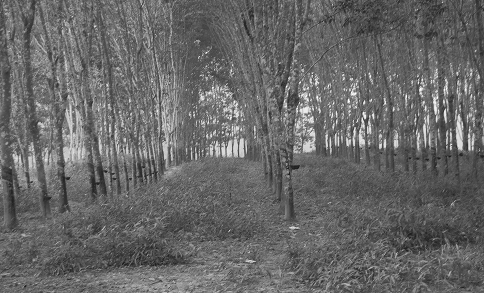This blog post is written by Anna-Klara Lindeborg, research advisor at SLU Global, in conjunction to IUFRO 2024.

As IUFRO 2024 – Forest and Society towards 2050 is coming to an end, I am reflecting on some of the sessions at the conference in conjunction to my own career path and research. The focus is to put attention to the research within the forestry sector and gender, a topic that has been part of my life for almost twenty years and an evident topic at IUFRO 2024.
Taking part in the session Local ecological knowledge of non-wood forest products for sustainable forest management and human well-being in diverse contexts, brings me back to 2006, when I was carrying out a Minor Field Study in Laos about gendered labour and the collection of fuel wood, which later became the reason why I wanted to apply for a PhD position.
When I was admitted as a PhD student in Social and Economic Geography at Uppsala University one year later, I signed up for a PhD course in Forest Governance at SLU. Part of the course was to participate in a pre-conference training workshop in Umeå with the title Adaptation of Forests to Climate Change: Working effectively at the Interface of Forest Science and Forest Policy, jointly organised by IUFRO’s Special Programme for Developing Countries (IUFRO-SPDC) and SLU. A special session was set up focusing on gender relations – Asking the right questions of society-forest adaptation – How can a gender perspective help? Gun Lidestav, associate professor in forest management at SLU, was the main driver of the session. She has been heavily engaged in IUFRO in several ways and in the field of gender and forestry. In IUFRO 2024 she was moderating the poster session In practice of a gender equal and inclusive forestry sector. One of the presentations focused on the project Gender dimensions to climate resilience of cocoa farming systems in West Africa, involving SLU professor Francisco Aguilar.
Another researcher at SLU contributing to the field of gender and forestry is Professor Seema Arora-Jonsson, who was teaching at the Forest Governance PhD course in 2008 that I was undertaking and was now participating in IUFRO 2024 in the session Integration of gender and diversity perspectives in knowledge production, amongst other things.

Inspired by Lidestav’s and Arora-Jonsson’s work, I continued writing on my PhD thesis, which I defended in 2012 with the title Where Gendered Spaces Bend – the rubber phenomenon in Northern Laos. Associate professor Ann Grubbström, researcher in Environmental Communication at SLU, was in addition important for my research, as her comments and input meant a lot for my PhD thesis. She also participated at IUFRO 2024 in the poster session Smart Forestry – Transforming Forestry and the Future Forest Workforce and has hence contributed a lot to the research field of gender and forestry.
After different turns and career paths, I started as a research advisor at SLU Global in 2021. One of the tasks I have been engaged with recently is the MOOC for Gender Equality and Diversity in Forestry, coordinated by Ida Wallin, researcher at the Southern Swedish Forest Research Centre, SLU. The MOOC is supposed to achieve gender equality and diversity in forest-related sectors as well as bridging the education–practice gap. In addition, the course is one of the outputs for Gender Equality Taskforce within IUFRO, an important and relevant contribution from SLU Global and contributes to the implementation of the policy for SLU’s global contribution to Agenda 2030.
So to conclude it seems that several things are coming together attending IUFRO 2024. Almost 20 years have passed since I started to engage in the gender and forestry sector, but it is still a very vibrant and visible theme that is needed, even though it has developed a lot along the way. Many researchers at SLU are also involved within this broad research field, just a few of them mentioned here. I am pleased to say that I have contributed a little bit to this, however additional research is still needed on the topic which I hope to see at IUFRO 2029 in Kenya.
